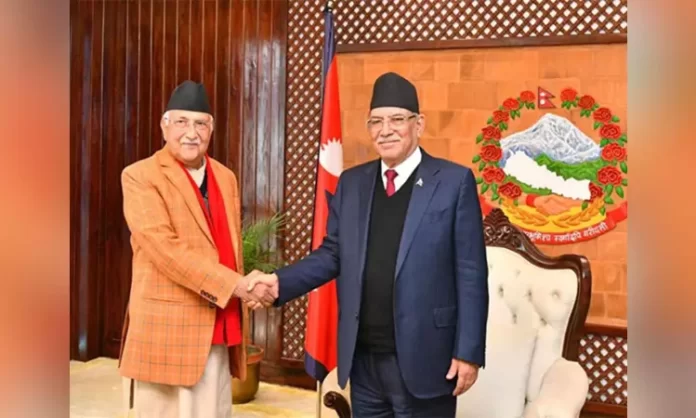The political landscape of Nepal has witnessed an upheaval as the coalition between the Maoist Centre and the Nepali Congress has collapsed, paving the way for a new government alliance to emerge. The dissolution of this coalition marks a pivotal moment in Nepal’s political trajectory, with implications for the country’s governance and future direction.
The Maoist Centre and the Nepali Congress, two prominent political parties in Nepal, had formed a coalition government in an attempt to consolidate power and address the nation’s pressing challenges. However, simmering tensions and divergent priorities within the coalition ultimately led to its unraveling.
The collapse of the Maoist Centre-Nepali Congress coalition has prompted a reshuffling of political alliances, as parties scramble to realign themselves and seize the opportunity to assert their influence. Against this backdrop, a new government alliance has emerged, signaling a shift in Nepal’s political dynamics.
The formation of this new government alliance is a reflection of the fluid and ever-changing nature of Nepali politics, where coalitions are formed and dissolved with remarkable frequency. It underscores the importance of adaptability and strategic maneuvering in navigating the complexities of Nepal’s political landscape.
Amidst the turmoil of shifting alliances and coalition dynamics, one thing remains certain: the imperative of addressing the pressing challenges facing Nepal. From economic instability to social inequality and political unrest, the country grapples with a myriad of complex issues that demand decisive action and effective governance.
As Nepal transitions to a new government alliance, there is both optimism and apprehension about the prospects for meaningful change and progress. While the formation of a new coalition presents an opportunity for fresh ideas and initiatives, there are also concerns about the stability and effectiveness of the new government.
Key stakeholders, including political leaders, civil society organizations, and the general public, are closely monitoring developments, eager to see how the new government alliance will tackle the formidable challenges confronting Nepal. The success or failure of the new coalition will hinge on its ability to foster unity, consensus, and collaboration among its members, as well as its capacity to enact meaningful reforms and address the pressing needs of the country.
In the midst of political uncertainty and upheaval, it is essential for Nepal’s leaders to prioritize the interests of the people and work towards building a more inclusive, equitable, and prosperous society. The collapse of the Maoist Centre-Nepali Congress coalition serves as a sobering reminder of the fragility of political alliances and the need for sustained efforts to strengthen democratic institutions and processes.
Moving forward, Nepal’s political leaders must demonstrate vision, integrity, and a commitment to serving the common good. By fostering dialogue, cooperation, and consensus-building, they can chart a course towards stability, progress, and prosperity for the nation and its people.
In a significant political development, Nepal witnessed the collapse of the coalition between the Maoist Centre and Nepali Congress, leading to the formation of a new government alliance. This upheaval marks a pivotal moment in the country’s political landscape, prompting speculation and reshuffling among key political players.
The dissolution of the Maoist Centre-Nepali Congress coalition comes amidst mounting tensions and disagreements over various policy issues and governance matters. Despite initial optimism surrounding the coalition’s formation, divergent ideologies and conflicting agendas gradually strained the partnership, culminating in its eventual breakdown.
As the coalition unravelled, political maneuvering and negotiations ensued, paving the way for the emergence of a new government alliance. The intricate process of coalition-building involved delicate negotiations and strategic alignments among various political parties vying for power and influence.
Amidst the political flux, the contours of the new government alliance began to take shape, heralding a new chapter in Nepal’s political trajectory. With the realignment of political forces, stakeholders sought to consolidate their positions and advance their respective agendas in the ever-evolving political landscape.
The formation of the new government alliance represents a recalibration of political dynamics and power structures within Nepal. As parties navigate the complexities of coalition politics, alliances are forged and dissolved based on shifting priorities and strategic calculations.
For the people of Nepal, the implications of these political developments are far-reaching, with implications for governance, policy-making, and the socio-economic trajectory of the country. As the dust settles on the dissolution of the Maoist Centre-Nepali Congress coalition, attention turns to the prospects and challenges of the nascent government alliance.
Amidst the fluidity of Nepal’s political landscape, questions abound regarding the stability and longevity of the new government alliance. As political parties vie for supremacy and influence, the specter of instability looms large, casting a shadow of uncertainty over the country’s governance and stability.
Against this backdrop, the role of leadership emerges as a critical factor in navigating the complexities of coalition politics and steering the country towards progress and prosperity. The ability of political leaders to foster consensus, bridge divides, and prioritize the interests of the nation will be instrumental in charting a course for Nepal’s future.
As Nepal stands at a crossroads, the formation of the new government alliance signals a moment of reckoning for its political establishment. The challenges ahead are formidable, but so too are the opportunities for renewal, reform, and revitalization.

